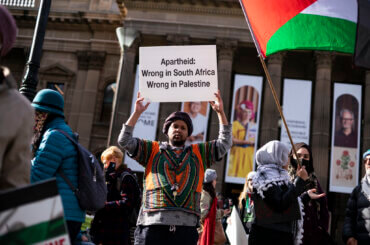This is part of Marc H. Ellis’s “Exile and the Prophetic” feature for Mondoweiss.
In our post-Gaza malaise – or is it rather our post-Gaza back-to-business-as-usual? – last week’s passage of a divestment resolution by 400 delegates at the Connecticut Conference of the United Church of Christ (CTUCC) and Noam Chomsky’s appearance at the United Nations seem to be opposite sides of the spectrum.
The UCC and the churches in general are belatedly coming face to face with the future of Israel-Palestine. Chomsky at 85 years of age is, at least partly, dwelling in the past.
Clearly Chomsky is aging and though his mind and memory remain sharp, his physical appearance tells another story. At some point, the second major pillar of the Israel-Palestine narrative – the Jewish complement to the Palestinian Edward Said – will be departing the scene.
At least privately, some critics on the Left think Chomsky is passé. But with Gaza’s – and Palestine’s – future still-born, Chomsky’s aging visage is worth reconsidering. Here I’m thinking less of Chomsky’s controversial stance on BDS which he reiterated in his UN appearance, than his overall narrative sensibilities which were in full play.
When most people think of Chomsky, they think intellect and perseverance. But like Said’s Palestinian sensibility, Avram Noam Chomsky can’t be understood outside his Jewishness. Chomsky’s Jewishness was at play at the UN when he responded to a question about the charges of anti-Semitism and Jewish self-hate leveled at critics of Israeli policy. Usually adverse to employing Jewish symbolism, Chomsky unexpectedly employed the Biblical story of the Prophet Elijah’s confrontation with King Ahab. Viewing Ahab as the “epitome of evil” in the Hebrew Bible, Chomsky recalled Ahab’s baiting of Elijah with the epitaph “hater of Israel.” For Chomsky the choice was clear. As a Jew, he would rather be identified with Elijah than Ahab.
Chomsky may have been dipping into his quite extensive Jewish upbringing for a simple and easily understood response to the issue at hand. Yet his venue was the UN not a synagogue or a church. Could Chomsky’s response have been a heretofore unannounced summing up of his life-long stance as a Jew of Conscience with his obvious standing in direct relation to the Jewish prophetic tradition?
As with Said, whose general philosophical and deconstructive identity-centered narrative was legendary, Chomsky’s universalist narrative structure concentrating on the critique of American imperial power is known throughout the world. Like Said in his later years, Chomsky is by now entirely and productively predictable. One listens knowingly, anticipating his political analysis, intonations, often employed examples and dry and penetrating wit.
Like Said in his later years, Chomsky has his critics on the Left. Chomsky has been around for so long, remains so prolific – in short, Chomsky takes up narrative space other interpreters seek. Some think that not only has his time passed, Chomsky may, especially with reference to the “next-step” BDS, be a brake on the progress of Israel-Palestine activist movements.
It isn’t just Chomsky’s controversial views on BDS. Chomsky remains a qualified two-state advocate when many question the viability or desirability of such a resolution of the Israeli-Palestinian conflict.
Having opened Chomsky to critique and with commentators passing over him in silence as a more or less irrelevant figure for the future, think of what is left. Surely, narrative structures without activism are empty philosophical luxuries. But activism without an overall narrative can be illusory. In this narrative vacuum, forward movement may occur but a future without an articulated destination is hard to mobilize around or draw others into a mobilization that isn’t only about fulfilling immediate self-interest. Without relying on or overemphasizing deep structures of meaning, which without active struggle are empty, narrative in the service of achievable justice is important.
Since Edward Said’s death activism on the Palestinian issue has increased dramatically. Nonetheless, without Said, an overall Palestinian sensibility is yet to be articulated. Likewise as Chomsky has ceased to be on the cutting edge of the Israel-Palestine discussion, Jewish activism has increased dramatically. In some ways, however, this exploding activism has both Said and Chomsky as their progenitors. As time passes and no one takes their place, and with the situation in Israel-Palestine continuing to worsen, the question remains as to whether activism may become misdirected or, losing a framework for hope, languish.
Today, democracy and the one-state solution are the cutting edge of Israel-Palestine activism. In some ways they are fitting extensions of both Said’s and Chomsky’s legacy, even if neither thinker went there completely. But these are long range hopes rather than grand narratives. Palestinians and Jews have histories that encompass and also transcend ways of organizing their cultural and political life in Israel-Palestine.
Listening to Chomsky at 85, we are reaching – have we already reached? – another end. Is this end also a new beginning?



The UCC and the churches in general are belatedly coming face to face with the future of Israel-Palestine.
That’s true about the main Protestant churches. The Quakers and Eastern Christian (eg Arab) churches have faced it for a long time.
I like Chomsky- he seemed to have a good demeanor at the conference. It’s disappointing that Hostage left when I was making criticisms to some of Chomsky’s views.
I didn’t have any serious disagreement with what Marc said here. He’s basically correct.
I have a lot of time for Chomsky but the days when Jews got to monopolise the discussion are over, khalaaas.
Ken O’Keefe was wrong about the revolution in Egypt but he was right about the world turning on Zionist nihilism towards Gaza
http://www.youtube.com/watch?v=Yl7H12cYBZ8
around 4 minutes in
And it’s precisely because Jewish mismanagement of the Palestinian issue that this is the case. Chomsky is as entitled to a platform as Umm Majid (age 85 , refugee from Jaffa) in Beach camp in Gaza. We need to hear more Palestinian voices because this is their issue too.
Nobody knows hos this struggle will end but it certainly won’t be decided exclusively by Jews. That’s just a recipe for disaster.
Get all the old Jews in suits off the stage and start listening to young Palestinians and deprogrammed Sabras.
http://www.youtube.com/watch?v=b3AMfZjFeVk
Zionism is too murderous to be a viable virus with a future.
“The moral choice is to resist the OCCUPATION.”
The US, the ‘Anglosphere’ and their allies are at fault for Israel’s continued intransigence, not Professor Chomsky.
Both Said (RIP) and Chomsky are national treasures imho. Thank you for sharing this, Prof.
(btw, i’m not ever going to eat ‘Sabra’ hummus or baba ghanoush. I make my own.)
So Israel’s actions are clearly criminal and Israel’s strongest supporters are members of the “Anglosphere.” Shouldn’t we be doing better?
Chomsky’s point beginning at the 15:00 mark about Elijah and Ahab took me a few passes to understand completely. Guess I’m not up on my Old Testament these days, but I gather he’d rather complain about the leadership of Israel and be called an anti-Semite than be associated with the “totalitarian mentality,” as he put it.
So Abba Eben is responsible for propelling the awful “criticizing Israel equals anti-Semitism” meme years ago. Seems like he did a great job, since the phrase is now right up there with, Things go better with Coke.
BTW, does anyone know Chomsky’s stated reasons for being against BDS?
.
85, eh?
.
You don’t say.